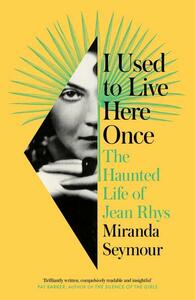Take a photo of a barcode or cover
For years, I kept hearing about this Jean Rhys and this novel Wide Sargasso Sea. I found a copy of the novel and finally read it, riveted. I loved her reimagining of the ‘mad wife’ in Jane Eyre, Bronte’s story turned into a social commentary about colonialism and the rejection of female sexuality.
That was twenty years or so ago. I knew nothing more about Rhys when I picked up this new biography, I Used To Live Here Once by Miranda Seymour. Her portrait of Rhys is unforgettable and complex, the story of a woman born too soon, who lived passionately and in seclusion, married unwisely for love, plummeted from wealth to poverty, and rose to fame to forgotten to lionized.
Seymour writes that “Rhys often said that she wrote about herself because that was all she knew,” and throughout the biography she demonstrates how Rhys’ characters were born of her experience, but also that they are born of Rhys’ imagination, and are not autobiographical clones. Rhys took what she knew, her Dominican childhood, her young adulthood as a chorus girl on tour, her bohemian life in Paris, her love affairs and marriages, and turned it into dark stories that publishers found too raw, unfit for a woman writer’s pen.
We met a woman who is damaged but determined, who bends to her weaknesses and shows incredible strength. Her beauty and charm lured men to want to possess her, then her violent temper dealt out blows. She walked away from an education to pursue the stage and yet wrote what the BBC identified as one of the ‘top 100 most influential novels.’
Her life was almost incomprehensibly complicated! If anyone truly lived, it was Rhys. Over her long life she went mad and discarded friends and men, hobnobbed with so many important people! Like so many Lost Generation writers she struggled with alcoholism, drug dependency and depression. She suffered accidents, underwent abortions, and was hospitalized for mental breakdown. No wonder she created unforgettable characters, women who contended with so much.
She was seventy-five years old when she published Wide Sargasso Sea in 1966. Rhys was ‘rediscovered’ by a new generation, finally found financial security, and unwelcomed fame. To the end of her life, she took care of her appearance, this petit blue-eyed, once blond-haired octogenarian, with her pink and white wigs and fashionable colorful clothes.
You won’t always like Jean Rhys. But you will be impressed by her resilience and determination.
Now, to read the rest of her work…
I received a free egalley from the publisher through NetGalley. My review is fair and unbiased.
That was twenty years or so ago. I knew nothing more about Rhys when I picked up this new biography, I Used To Live Here Once by Miranda Seymour. Her portrait of Rhys is unforgettable and complex, the story of a woman born too soon, who lived passionately and in seclusion, married unwisely for love, plummeted from wealth to poverty, and rose to fame to forgotten to lionized.
Seymour writes that “Rhys often said that she wrote about herself because that was all she knew,” and throughout the biography she demonstrates how Rhys’ characters were born of her experience, but also that they are born of Rhys’ imagination, and are not autobiographical clones. Rhys took what she knew, her Dominican childhood, her young adulthood as a chorus girl on tour, her bohemian life in Paris, her love affairs and marriages, and turned it into dark stories that publishers found too raw, unfit for a woman writer’s pen.
We met a woman who is damaged but determined, who bends to her weaknesses and shows incredible strength. Her beauty and charm lured men to want to possess her, then her violent temper dealt out blows. She walked away from an education to pursue the stage and yet wrote what the BBC identified as one of the ‘top 100 most influential novels.’
Her life was almost incomprehensibly complicated! If anyone truly lived, it was Rhys. Over her long life she went mad and discarded friends and men, hobnobbed with so many important people! Like so many Lost Generation writers she struggled with alcoholism, drug dependency and depression. She suffered accidents, underwent abortions, and was hospitalized for mental breakdown. No wonder she created unforgettable characters, women who contended with so much.
She was seventy-five years old when she published Wide Sargasso Sea in 1966. Rhys was ‘rediscovered’ by a new generation, finally found financial security, and unwelcomed fame. To the end of her life, she took care of her appearance, this petit blue-eyed, once blond-haired octogenarian, with her pink and white wigs and fashionable colorful clothes.
You won’t always like Jean Rhys. But you will be impressed by her resilience and determination.
Now, to read the rest of her work…
I received a free egalley from the publisher through NetGalley. My review is fair and unbiased.
A Caribbean ghost story: dull minds sometimes come out with things like “truth is stranger than fiction” and “art imitates life”, platitudes up with which Jean Rhys would indubitably not have put. For as Miranda Seymour’s controlled, meticulous biography shows, life and art intertwine in a way that if one is not careful can become difficult to untangle.
Rhys was a glorious monster. The favoured daughter of a likeable island GP from Dominica, whose fractured relationship with her philistine mother drove so much of her action, comes to London determined to learn to be an actress, and lodges with family: “‘I’ve already noticed,’ her aunt remarked tartly, ‘that you are quite incapable of thinking of anyone but yourself.’” This, and a part-submerged longing to go back to her Caribbean home, are motifs that stay with the former Ella Gwendoline Rees Williams throughout her life.
I Used To Live Here Once carries us through a rich carnival of event and feeling that would inform her writing - from chorus girl, via rich man’s kept woman, marriage to a Dutch-Belgian convict, affair with Ford Madox Ford, second marriage to her publisher’s reader, third marriage to his cousin, to life in a remote Devon village where she achieves Mad Old Lady status, is tormented by the yokels, slapped by a vicar’s wife, and has a bucket of water poured over her while drunk by a neighbour. She ends her days on a pink chaise longue in George Melly’s Camden Town attic, still knocking back a quarter bottle of whisky a day, railing at all and sundry, and longing for a return to the half-imagined tropics of her girlhood. This is how old age, if it must, should be.
Despite her difficulties - and how difficult she could be - Rhys remains one of the most important writers in English of the 20th century. “Keeps one all the time at the central point of feeling,” said one critic not always sympathetic to her, and to achieve this, one feels and Seymour drives towards it, requires a degree of solipsism, self-centredness and focus on one’s own feelings. An author who would muse for years on the correct deployment of a phrase she’d devised is the flip side of a woman who could bear long grudges, scream drunkenly at friends who went to considerable lengths on her behalf, and hurl stones through the windows of neighbours who’d pissed her off.
I Used To Live Here Once is sympathetic without making excuses, deftly written, and enlightening both of a charismatic, challenging human and what informed her extraordinary writing
Rhys was a glorious monster. The favoured daughter of a likeable island GP from Dominica, whose fractured relationship with her philistine mother drove so much of her action, comes to London determined to learn to be an actress, and lodges with family: “‘I’ve already noticed,’ her aunt remarked tartly, ‘that you are quite incapable of thinking of anyone but yourself.’” This, and a part-submerged longing to go back to her Caribbean home, are motifs that stay with the former Ella Gwendoline Rees Williams throughout her life.
I Used To Live Here Once carries us through a rich carnival of event and feeling that would inform her writing - from chorus girl, via rich man’s kept woman, marriage to a Dutch-Belgian convict, affair with Ford Madox Ford, second marriage to her publisher’s reader, third marriage to his cousin, to life in a remote Devon village where she achieves Mad Old Lady status, is tormented by the yokels, slapped by a vicar’s wife, and has a bucket of water poured over her while drunk by a neighbour. She ends her days on a pink chaise longue in George Melly’s Camden Town attic, still knocking back a quarter bottle of whisky a day, railing at all and sundry, and longing for a return to the half-imagined tropics of her girlhood. This is how old age, if it must, should be.
Despite her difficulties - and how difficult she could be - Rhys remains one of the most important writers in English of the 20th century. “Keeps one all the time at the central point of feeling,” said one critic not always sympathetic to her, and to achieve this, one feels and Seymour drives towards it, requires a degree of solipsism, self-centredness and focus on one’s own feelings. An author who would muse for years on the correct deployment of a phrase she’d devised is the flip side of a woman who could bear long grudges, scream drunkenly at friends who went to considerable lengths on her behalf, and hurl stones through the windows of neighbours who’d pissed her off.
I Used To Live Here Once is sympathetic without making excuses, deftly written, and enlightening both of a charismatic, challenging human and what informed her extraordinary writing
This was a challenging journey through the often tortured life of Jean Rhys. She must have been strong-willed to continue despite her difficulties.
She came across as a deeply unhappy woman who took it out on those around her. I can’t say that I enjoyed this book, but it’s worth reading.
She came across as a deeply unhappy woman who took it out on those around her. I can’t say that I enjoyed this book, but it’s worth reading.
informative
fast-paced
dark
informative
sad
medium-paced
dark
emotional
informative
sad
tense
medium-paced
A too long take on a Rhys that I finished because of my true interest in her life. I think Rhys herself would have insisted a lot of the repetition & focus on the frivolous be edited out. I was also disturbed by how easily the biographer wrote about the antisemitism, violence and hate spewed by Rhys in real life. We can understand why Rhys may have been so cruel and discriminatory but still hold her accountable. 2.5 stars, rounded up to 3 due to the meticulous research.
informative
slow-paced
Snoozefest and my apologies to the biographer, the subject, a mean alcoholic writer, is totally unlikable.
This was not a bad book, per se, but I did not really know anything about the person the story was about.
I have added her name to my research list and will possibly come back to this book later.
I have added her name to my research list and will possibly come back to this book later.
Probably 3.5 stars, but I rounded down because this felt kind of sloppy in the end. It's a mixed bag, and I agreed a lot with Dwight Garner's review in the New York Times, so I'd definitely suggest reading that.
What Seymour does well: Notably, she goes to great lengths to differentiate Rhys from the the protagonists of her novels and short stories. Too many readers and critics have fallen into the trap of taking her novels/stories as memoir simply repackaged as fiction. Unlike the women of Rhys's fiction, she wasn't going to give up, abandoned and alone in a dingy hotel. Rhys, even in desperate circumstances, was always a survivor. The book acknowledges just how many people helped support an at-times difficult woman through both poverty and success. I also appreciate that this book doesn't attempt to diagnose Rhys. We know she had a history of trauma. She self-medicated with alcohol. She was known for being verbally abusive and physically violent. She was, at times, paranoid. Seymour merely documents without judging or playing armchair psychologist. She documents Rhys in all her complexities and let's them just . . . be. The book really comes into its own and feels fleshed out once Rhys is rediscovered.
What Didn't Work: For how sensitively she treats Rhys's complicated mental health, towards the end of the book, some of the language she uses to describe Rhys in older age reads as a little . . . cruel? And there are a frustrating amount of gaps in Rhys's biography, so Seymour is forced to speculate. She's always upfront when she does it--which I appreciate--but it felt like she took a few too many liberties. I just found these gaps a little frustrating. We're never going to have a truly complete record of Rhys's life--and that's exactly how she wanted it. I was disappointed by just how little of an impression I still have of Rhys's early life, in particular, and the biography felt lean in this section.
I guess it's no surprise that I have complicated feelings about a complicated woman--whose work I deeply appreciate and am glad to see still merits recognition.
What Seymour does well: Notably, she goes to great lengths to differentiate Rhys from the the protagonists of her novels and short stories. Too many readers and critics have fallen into the trap of taking her novels/stories as memoir simply repackaged as fiction. Unlike the women of Rhys's fiction, she wasn't going to give up, abandoned and alone in a dingy hotel. Rhys, even in desperate circumstances, was always a survivor. The book acknowledges just how many people helped support an at-times difficult woman through both poverty and success. I also appreciate that this book doesn't attempt to diagnose Rhys. We know she had a history of trauma. She self-medicated with alcohol. She was known for being verbally abusive and physically violent. She was, at times, paranoid. Seymour merely documents without judging or playing armchair psychologist. She documents Rhys in all her complexities and let's them just . . . be. The book really comes into its own and feels fleshed out once Rhys is rediscovered.
What Didn't Work: For how sensitively she treats Rhys's complicated mental health, towards the end of the book, some of the language she uses to describe Rhys in older age reads as a little . . . cruel? And there are a frustrating amount of gaps in Rhys's biography, so Seymour is forced to speculate. She's always upfront when she does it--which I appreciate--but it felt like she took a few too many liberties. I just found these gaps a little frustrating. We're never going to have a truly complete record of Rhys's life--and that's exactly how she wanted it. I was disappointed by just how little of an impression I still have of Rhys's early life, in particular, and the biography felt lean in this section.
I guess it's no surprise that I have complicated feelings about a complicated woman--whose work I deeply appreciate and am glad to see still merits recognition.



